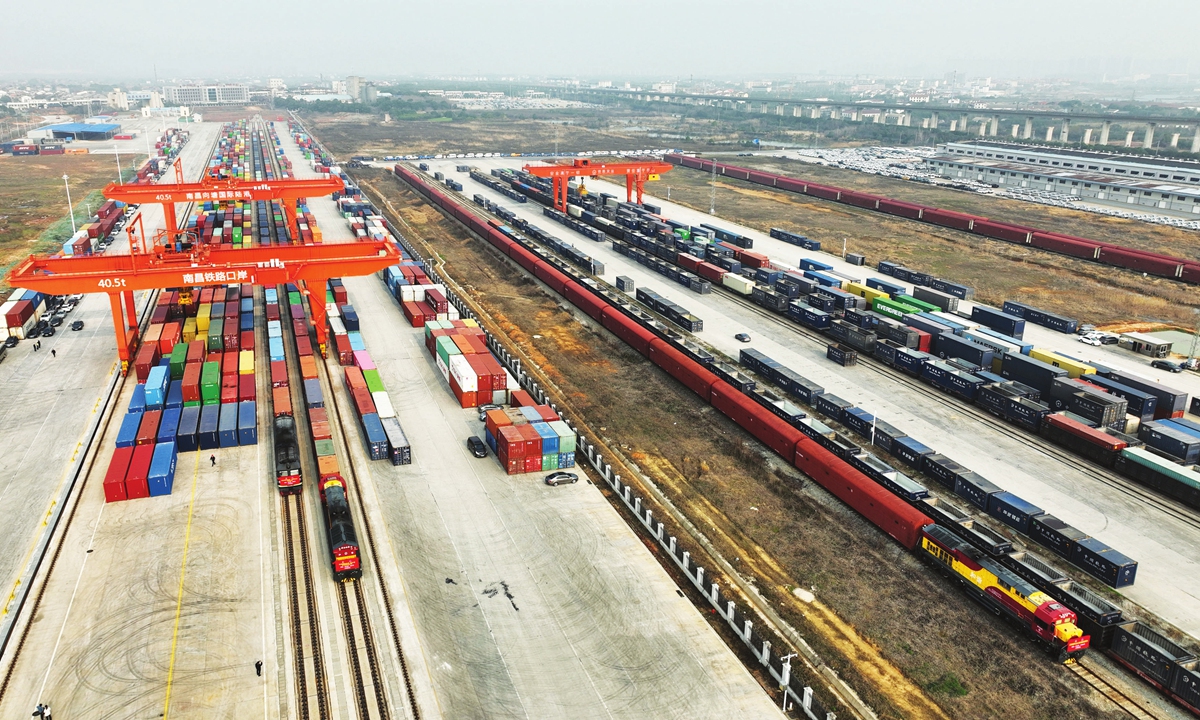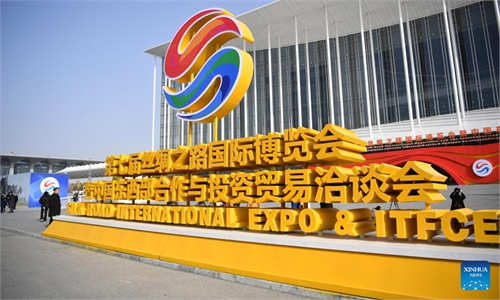‘Silk Road’ e-commerce flourishing
BRI helps accelerate industrial integration, rules alignment and cross-border trade

Three freight trains including a China-Europe freight train dedicated to "Silk Road" e-commerce depart from Nanchang city, East China's Jiangxi Province on March 2, 2023. The "Silk Road" e-commerce freight train departed from Nanchang to Moscow via Manzhouli port in North China's Inner Mongolia Autonomous Region. Photo: cnsphoto
The "Silk Road" e-commerce, an international cooperation platform for trade and economic cooperation under the important Belt and Road Initiative (BRI), has formed a structure for growing digital partnership, while helped promote mutual growth and cooperation among all participating economies.
E-commerce representatives from the BRI partner countries told the Global Times recently that "Silk Road" e-commerce has fostered rising innovation and tighter connectivity across a good number of industrial lines, moving toward forming a global e-commerce market as part of the BRI to promote rapid growth among all partner economies.
How to better develop the "Silk Road" e-commerce was a highlight at the recently concluded second Global Digital Trade Expo (GDTE). The expo featured a Silk Road E-commerce Pavilion, showcasing the achievements ever made in advancing economic and trade cooperation among all BRI partner economies.
Additionally, a sub-forum entitled "the 2023 Silk Road E-Commerce International Cooperation Forum" was held too, attracting more than 600 representatives from the BRI partner countries, relevant international organizations and the academics.
Great progress made
The 2023 Silk Road E-Commerce International Cooperation Forum released the Silk-Road E-commerce Development Report 2016-2023 that reviews the progress made in the "Silk Road" e-commerce and outlined the promising future of international cooperation and development in facilitating e-commerce growth among the participating countries.
According to the report, as of October this year, China has signed electronic commerce cooperation memorandums with 30 countries and established bilateral mechanisms for accelerating e-commerce cooperation.
Data shows that, in 2022, China's cross-border e-commerce trade with 30 "Silk Road" e-commerce partner countries accounted for 31.5 percent of China's total cross-border e-commerce volume. The range of products in cross-border e-commerce spans from clothing, shoes and foods to consumer electronics and other commodities.
And, the development of "Silk Road" e-commerce has helped create good opportunities for small and medium-sized enterprises (SMEs) to expand their global market share, while it has also assisted to introduce special overseas products to the huge Chinese market, Wen Jia, President of the Public Affairs Department of Alibaba Group, said at the forum.
In the first nine months this year, overall orders across Alibaba's international digital business platform increased by 15 percent, 25 percent, and 28 percent, respectively, compared to the same period last year, reflecting accelerated growth and the tremendous potential of SMEs in promoting integrated development, Wen said.
From January to October this year, Alibaba's e-commerce platforms have imported over 66 billion yuan ($9.22 billion) worth of goods from the countries involved in the "Silk Road" e-commerce, such as Thai durians and fruit juice, Indonesian fishing equipment, Kazakh dairy products, Brazilian steaks, and chocolates from the UAE , which are highly favored by Chinese consumers, Wen said.
Haizol.com, the comprehensive parts procurement and key components trading platform, has seen a significant increase in purchasing orders from countries participating in the BRI.
Liu Haitao, vice president of Haizol, told the Global Times that the platform has experienced a 150-percent growth in orders from BRI partner countries so far this year compared to the same period last year due to the improvement of the cross-border e-commerce ecosystem, particularly, the digital trading infrastructure, aided by the improved internet coverage in the BRI partner countries.
It is very encouraging to see more countries embracing the internet and using digital technology to grow "Silk Road" e-commerce, Liu said.

The Silk Road E-commerce Pavilion at the second Global Digital Trade Expo Photo: Qi Xijia/GT
Improved infrastructure
In addition to the trade of goods, "Silk Road" e-commerce also promotes closer industrial integration, thanks to enhanced cross-border communication conditions. It empowers Chinese e-commerce platforms to share new and efficient business models with all BRI partner countries, which enhances convenience and fosters deeper understanding and optimizes inter-connections between the nations, the consumers, and businesses.
Business participants who are part of the initiative are looking forward to accelerating the alignment with international digital economic and trade rules, while promote their cooperation to a new level.
China has set "a global standard for e-commerce," which is a very good example for other countries, Mendbayar Tseveen, CEO of a Mongolian company told the Global Times.
"I think to bring Chinese standards to [integrate with] the global eco-system would be much efficient for the smaller countries that will be more effective and help lower the cost," Tseveen said.
In the past several years, the rapid growth of e-commerce has changed the landscape for internet-based businesses in Mongolia. "This digitalization movement is inspiring Mongolian young generation and we want to build more e-commerce infrastructure to help Mongolian companies be connected to global trade," he said.
Liu from Haizol.com also said that his company is actively working towards becoming an international e-commerce platform by integrating overseas production capacity with its digital ecosystem.
"We are constructing multiple language versions to cater to our global audience and customers," Liu said.
According to the report, China will continue to expand its network of partners and strengthen international consensus in the new stage of development for "Silk Road" e-commerce cooperation.
More efforts will be made to enrich areas of cooperation, promote the development of new areas such as digital payments and intelligent logistics. Efforts will also be stepped up to align with international digital trade rules and take cooperation to a new and high level.

Visitors from Nepal experience Chinese VR products at the second Global Digital Trade Expo Photo: Qi Xijia/GT



